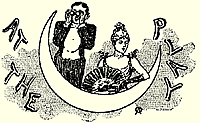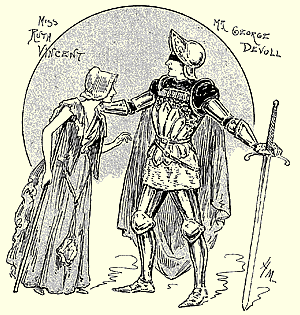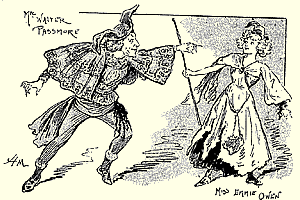 |
 |
||||||
Review from Moonshine
June 11, 1898.
"THE BEAUTY STONE"

The cause of their complaining tones is their poverty (there I sympathise with them) and a crippled daughter, Laine. Presently enter the unhappy child, followed by a mob of jeering Flemish citizens, evidently the same who caused our army to swear terribly when in Flanders. The elderly weavers push out the mob, and go off for the supper beer. They say it's water they're going to bring home — likely tale that! While the poor cripple is lamenting hard times and bad looks, the Devil (yes, printed in large letters on the programme), disguised as a monk with lobster-claw fingers appears to offer consolation. He is really most kind, and presents crippled Laine with a precious stone which , ensures her beauty and golden hair like unto the hair-restoring advertisements. Miss Laine dashes off prompt side to try the effect of the Beauty Stone, and Scene 2 shows us the market-place. Here we find the Lord of Mirlemont, who's been a bit of a pugilist in the frontier fray line, arrived to inspect the beauty of the town. He's rather an outsider this Mirlemont man; he's got a very nice girl, and. he's come to the village to see if they can sport anything better in the female line. The Burgomaster trots out several beauties, but none please this fifteenth century Sultan till the crippled girl — now beautiful, thanks to the Devil (programme again) — walks on. Then the Lord Mirlemont remarks in song that this is all right, and asks her to share his happy home. Delight and surprise are expressed in song, and that concludes the first act.
Act II. At the Castle, where the Mirlemont man and a few sports are playing fifteenth century nap. The weaver's daughter is there, too, looking very nice thank you, the deposed lady love, and the Devil (programme again). Several tin-plated gentlemen arrive, and ask Philip of Mirlemont to take a hand in a little raid they are planning. He declines with the remark that he is otherwise engaged. Not a bad judge either, considering the lovely women he has round him. However, towards the end of the scene, encouraged by an elderly retainer, he plucks up and agrees to join their wiping-out expedition. More delight in song and chorus, and we return to the weaver's home. Here enters hurriedly the beautified cripple, who says she has had enough of being beautiful, and anyone can have the wretched Beauty Stone. Her father — the aged weaver — takes it on, and instantly becomes young and handsome. He gets into trouble, too, through the talisman, and the only person who seems to enjoy the fun is the Devil (I refer you to the programme).

The last act is very tedious — none of them are exhilarating to a degree. Philip, the Lord of Mirlemont, returns from the war minus his eyesight. He refuses to have anything to do with the nice girl who was so fond of him that she stole the talisman to make herself more beautiful in his eyes, and suddenly remembers the poor cripple girl. He determines to wed her forthwith; chairs are produced, the cripple is seated by his side, the Flemish citizens express more musical delight, and nearly all the characters assume delighted smiles. The Devil (programme's fault) says that it is no place for him — every-one being so good — and with the beauty stone in his pocket walks off; into his dressing-room, I suppose. Animated chorus, and the curtain falls to mild applause.

There is one pleasant recollection, and that is of the performance of Miss Emmie Owen. She shone, scintillated, sparkled — well, did everything that was possible to relieve the dullness. With a strong vein of comedy, a pretty face, an excellent singing voice, and brim full of go and vivacity, dainty Miss Owen was the hit of the evening. Mr. Passmore, as the. Devil (on the programme), had no chance to display his comedy powers. The remaining parts were admirably chanted — the chorus, of course, beyond reproach.
I am afraid " The Beauty Stone " won't draw all London. It may be a new departure, this romantic musical drama, but it is evident the authors have lost their way on the road. There is hardly one laugh through the length of three acts. It is even difficult to dig up a titter. The lyrics must have given Arthur Sullivan many sleepless nights — it is wonderful how music could ever have been fitted to such unrhythmical stuff. Of course, the production was in the taste and perfection we are accustomed to at the Savoy Theatre. But, after all, the play's the thing.
THE WATCHMAN.
Page modified 14 September 2011